La clave está en la ciencia, el cambio en ti
¿Te has preguntado alguna vez por qué, después de tomar antibióticos, experimentas molestias digestivas o por qué tu estado de ánimo puede cambiar cuando tienes molestias digestivas? Quizás has notado que cuando comes alimentos fermentados o cuidas la salud de tu intestino (comida real, buenos ayunos, etc), te sientes mejor y con más energía. O puede que vivas hinchado todo el día, sufriendo constantemente reacciones alérgicas o problemas respiratorios como asma, sin entender por qué ocurren estos síntomas. Estas situaciones están estrechamente relacionadas con la microbiota, un mundo microscópico que vive en tu interior (no solo en tu intestino) y desempeña un rol vital en tu bienestar general.
Qué es la microbiota y que funciones tiene
La microbiota es el conjunto de microorganismos vivos que residen en diferentes partes de nuestro cuerpo, siendo la microbiota intestinal la más estudiada y conocida, pero no la única (tenemos de piel, pulmón, vagina, entre otras partes del cuerpo) y coexiste con nostros desde que nacemos y a lo largo de toda la vida (1). Estos microorganismos incluyen bacterias, virus, hongos y protozoos que coexisten de manera simbiótica (trabajo en equipo) con el huésped humano. La microbiota juega un papel fundamental en diversos procesos de nuestro cuerpo, como la digestión y absorción de nutrientes, crear vitaminas, la respuesta inmune (2,3) y la generación de tolerancia inmunitaria (vital en alergias o autoinmunidad) (4,5,6). No hay definición exacta o consenso sobre qué composición de bacterias componen una microbiota saludable, sin embargo eso no significa que no tengamos una idea de que la compone. (1)

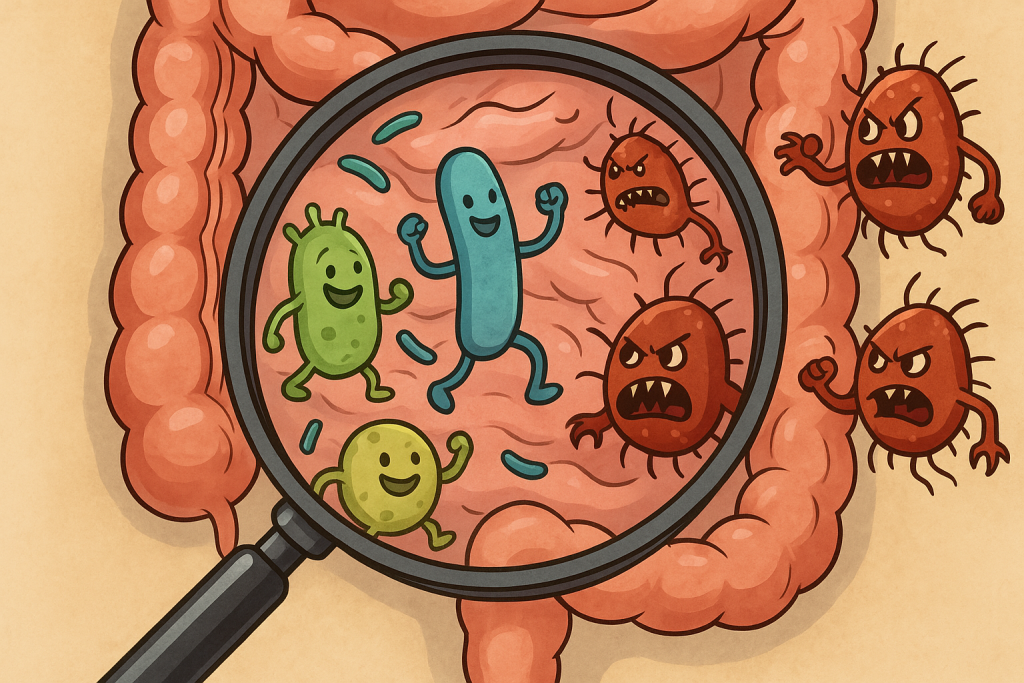
Causas del desequilibrio en la microbiota
Una microbiota alterada es una microbiota en disbiosis. Varios factores pueden alterar la composición y función de la microbiota hacía un punto negativo:
- Dieta occidental/de cafetería: Consumo elevado de alimentos procesados, azúcares refinados, y grasas hidrogenadas, dietas bajas en fibra o muy alta en fibras específicas o sistemas de alimentación muy rígidos afectan la microbiota.(7,12)
- Uso abusivo de antibióticos: Puede matar bacterias beneficiosas y favorecer el crecimiento de patógenos, así como generar resistencia a antibióticos por parte de las bacterias.(8,9)
- Estrés: El estrés crónico puede alterar la composición microbiana(13)
- Sedentarismo: La actividad física influye en la diversidad y abundancia de la microbiota. Se ha visto que la microbiota de personas con mayor nivel de actividad física tienen bacterias que son escasas o nulas en sedentarios.(10)
- Edad y cambios hormonales: Pueden afectar la microbiota a lo largo de la vida. La microbiota no solo puede cambiar a la largo de la vida, si no que debe hacerlo. Se ha observado que la microbiota de la vagina tiene cambios ligeros según la fase del ciclo menstrual (esto no es necesariamente malo, tranquila) (11,16)
- Exposición a toxinas y contaminantes: Afectan negativamente a los microorganismos intestinales. Los microplásticos en el ambiente, y los pesticidas en la comida pueden afectar a tu microbiota.(14,15)
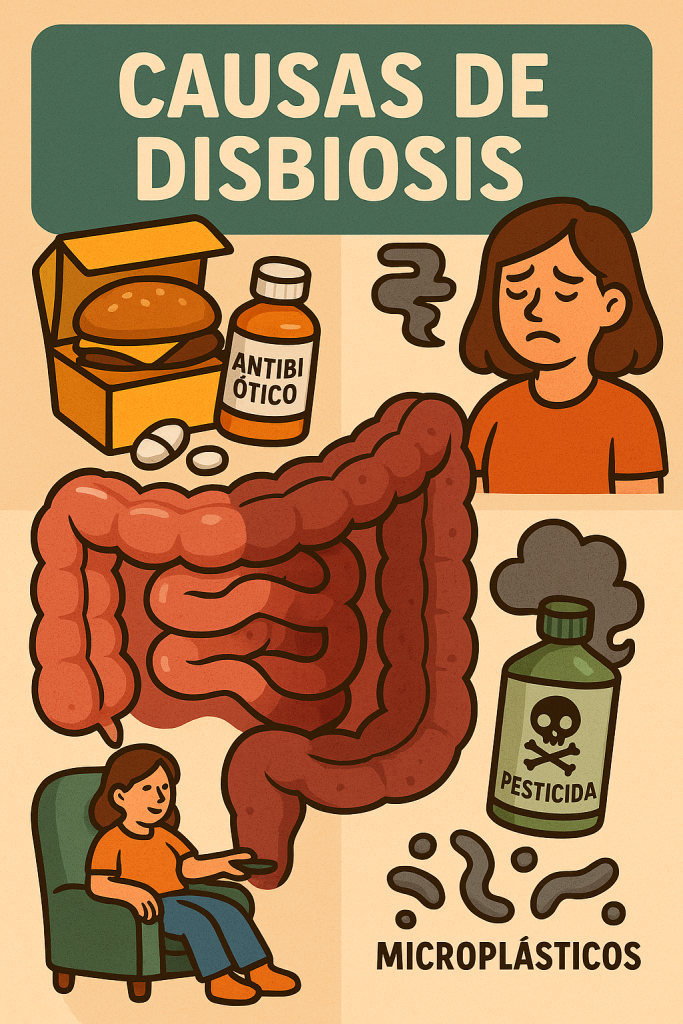
Consecuencias de una microbiota desequilibrada
Un desequilibrio en la microbiota puede conducir a:
- Enfermedades gastrointestinales: Como síndrome del intestino irritable y enfermedad inflamatoria intestinal, SIBO ,LIMO o cualquier sobrecrimiento de microorganismos. (17,18,19)
- Obesidad: Si bien la obesidad tiene muchas causas, no se puede negar que la microbiota influye en nuestras elecciones alimentarias y la absorción de distintos nutrientes. .(19 ,20)
- Alteración/ “desorden” del sistema inmunológico: Mayor susceptibilidad a infecciones y alergias (2,6)
- Ciclo menstrual alterado:Aún falta evidencia más sólida a mi parecer, pero ya se ven relaciones con bacterias específicas (21)
- Mayor número de enfermedades respiratorias: (22,23,24)
- Enfermedades autoinmunes: Como la diabetes tipo 1 y la esclerosis múltiple.(5, 25)
- Problemas de salud mental o condiciones mentales: Ansiedad, depresión y trastornos del estado de ánimo vinculados al eje intestino-cerebro, autismo, alzheimer, parkinson. neurotransmisores(26,27,28,29,30,31,32,33,34)
- Inflamación crónica de bajo grado: Contribuye al desarrollo de enfermedades crónicas.(35)
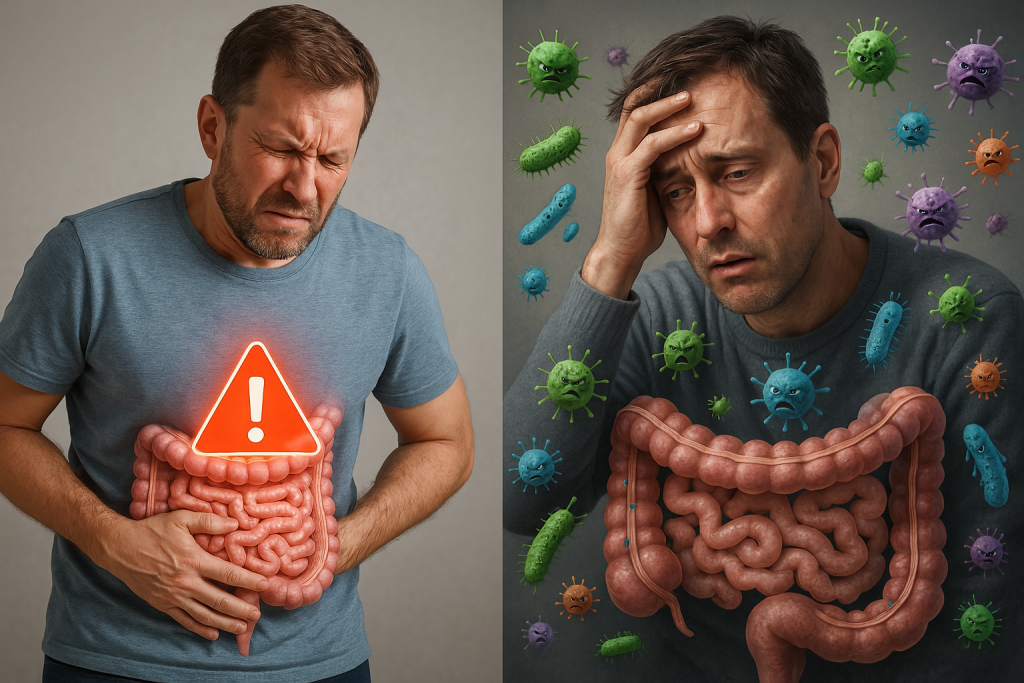
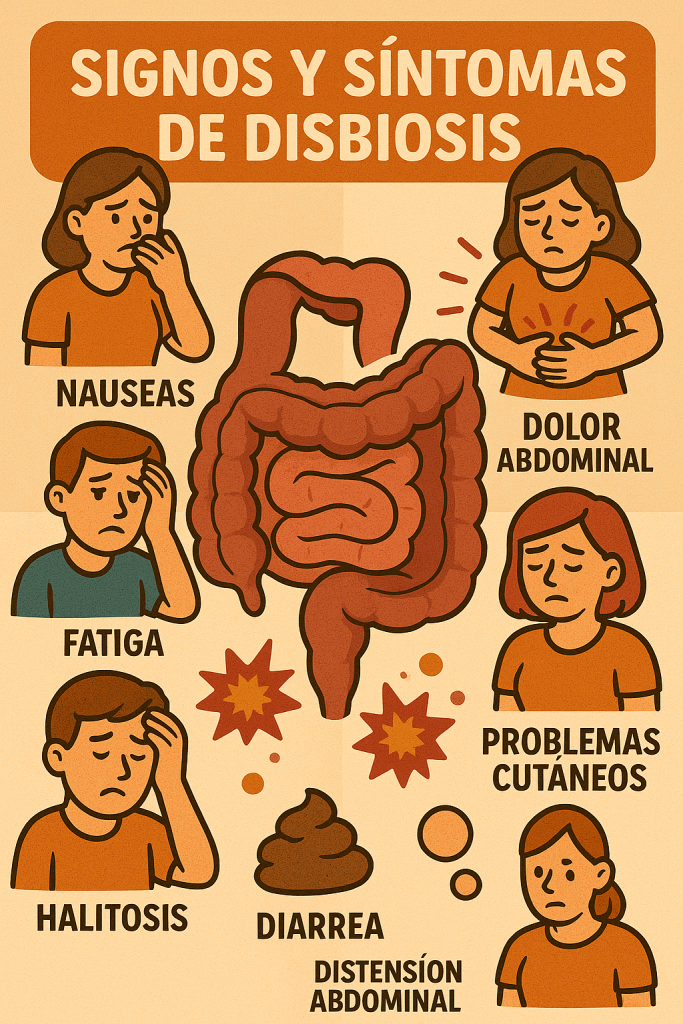
Medidas de acción para mejorar la microbiota
Para promover una microbiota saludable, se pueden adoptar las siguientes estrategias:
- Alimentación rica en fibra y prebióticos: Consumir frutas, verduras, granos integrales y legumbres que alimentan a las bacterias beneficiosas.(36)
- Come polifenoles: Presentes en frutas y verduras, sobre todo frutos rojos. Actuan como buen prebiótico (comida para bacterias) (37)
- Realiza ayunos intermitentes: El ayuno permite generar un reposo a tu sistema digestivo y llevar a cabo un proceso llamado complejo motor migratorio (CMM) (38,39)
- Incluir alimentos fermentados y probióticos: Yogur, kéfir, chucrut, kimchi y kombucha aportan microorganismos beneficiosos (40). Ten cuidado si tienes intolerancia a la histamina. Los alimentos fermentados tienen mucha histamina y te puede generar problemas. (41)
- Considerar suplementos probióticos: Bajo supervisión médica, pueden ayudar a restaurar el equilibrio microbiano (42.50) .Si te suplementas con probióticos sugiero alternar las cepas:
- Reducir el consumo de alimentos procesados y azúcares: Limitar alimentos que favorecen el crecimiento de bacterias perjudiciales (12,43)
- Evitar el uso innecesario de antibióticos: Los antibióticos salvan vidas, pero un abuso de ellos puede generar problemas como SIBO o intestino permeable. El uso incorrecto de antibióticos podrían generarte un SIBO peor del que estás tratando si es mal llevado. (44)
- Practicar actividad física regular: El ejercicio favorece una microbiota más diversa. (45,46)
- Manejo del estrés: Si bien no encontré estudios interesantes que prueben eficazmente que reducir el estrés puede mejorar la microbiota, si hay estudios de lo opuesto como ves mas arriba. El ejercicio, el buen dormir, técnicas de relajación que eviten que ese estrés suba o continúe evidentemente mejoraran tus síntomas digestivos y microbiota.
- Dormir adecuadamente: Un sueño de calidad influye positivamente en la microbiota .(47)
- Evitar el consumo de alcohol y tabaco: Ambos pueden alterar negativamente la microbiota aumenta la permeabilidad (investigar si reduce o aumenta x cepas) (48)
- Trasplante fecal:El trasplante fecal de personas sanas (recibir deposiciones de otra persona) ha mostrado buenos resultados en patologías como SIBO(49)

Sugerencias finales
La microbiota es una pieza clave de tu salud, íntimamente conectada con lo que comes, cómo vives y cómo te sientes. Antes de recurrir a medicamentos o suplementos, enfócate en construir una base sólida: una alimentación real, variada y rica en fibra, un ayuno y descanso reparador y una vida con movimiento constante.
Pequeños cambios pueden generar grandes beneficios.
Una microbiota en equilibrio contribuye no solo a una buena digestión, sino también a un sistema inmune fuerte, una mente más clara y un cuerpo menos inflamado.
No se trata de buscar la “microbiota perfecta”, sino de crear un entorno interno que favorezca a los microorganismos que trabajan contigo, no contra ti.
Empieza hoy. Tu salud comienza desde adentro

Referencias
- Human Microbiome Project Consortium. (2012). Structure, Function, and Diversity of the Healthy Human Microbiome. Nature, 486(7402), 207-214. https://doi.org/10.1038/nature11234
- Belkaid, Y., & Hand, T. (2014). Role of the microbiota in immunity and inflammation. Cell, 157(1), 121-141. https://doi.org/10.1016/j.cell.2014.03.011.
- Bäckhed, F., Ley, R. E., Sonnenburg, J. L., Peterson, D. A., & Gordon, J. I. (2005). Host-Bacterial Mutualism in the Human Intestine. Science, 307(5717), 1915-1920. https://doi.org/10.1126/science.1104816 .
- SSanidad, K. Z., Rager, S. L., Carrow, H. C., Ananthanarayanan, A., Callaghan, R., Hart, L. R., Li, T., Ravisankar, P., Brown, J. A., Amir, M., Jin, J. C., Savage, A. R., Luo, R., Rowdo, F. M., Martin, M. L., Silver, R. B., Guo, C.-J., Krumsiek, J., Inohara, N., & Zeng, M. Y. (2024). Gut bacteria-derived serotonin promotes immune tolerance in early life. Science Immunology, 9(93), eadj4775. https://doi.org/10.1126/sciimmunol.adj4775
- Wu, H. J., & Wu, E. (2012). The Role of Gut Microbiota in Immune Homeostasis and Autoimmunity. Gut Microbes, 3(1), 4-14. https://doi.org/10.4161/gmic.1932
- Rook, G. A. W., & Brunet, L. R. (2005). Microbes, Immunoregulation, and the Gut. Gut, 54(3), 317-320. https://doi.org/10.1136/gut.2004.053785
- Zinöcker, M. K., & Lindseth, I. A. (2018). The Western Diet–Microbiome-Host Interaction and Its Role in Metabolic Disease. Nutrients, 10(3), 365. https://doi.org/10.3390/nu10030365
- Francino, M. P. (2016). Antibiotics and the human gut microbiome: Dysbioses and accumulation of resistances. Frontiers in Microbiology, 6, 1543. https://doi.org/10.3389/fmicb.2015.01543.
- Blaser, M. J. (2016). Antibiotic use and its consequences for the normal microbiome. Science (New York, N.Y.), 352(6285), 544-545. https://doi.org/10.1126/science.aad9358
- Patel, B. K., Patel, K. H., Lee, C. N., & Moochhala, S. (2024). Intestinal Microbiota interventions to enhance athletic performance-A review. International Journal of Molecular Sciences, 25(18). https://doi.org/10.3390/ijms251810076
- O’Toole, P. W., & Jeffery, I. B. (2018). Microbiome–health interactions in older people. Cellular and Molecular Life Sciences, 75(1), 119-128. https://doi.org/10.1007/s00018-017-2673-z
- Conlon, M. A., & Bird, A. R. (2015). The impact of diet and lifestyle on gut microbiota and human health. Nutrients, 7(1), 17-44. https://doi.org/10.3390/nu7010017
- Leigh, S.-J., Uhlig, F., Wilmes, L., Sanchez-Diaz, P., Gheorghe, C. E., Goodson, M. S., … Clarke, G. (2023). The impact of acute and chronic stress on gastrointestinal physiology and function: A microbiota–gut–brain axis perspective. The Journal of Physiology, 601(20), 4491–4538. https://doi.org/10.1113/JP281951
- Gama, J., Neves, B., & Pereira, A. (2022). Chronic effects of dietary pesticides on the gut microbiome and neurodevelopment. Frontiers in Microbiology, 13, 931440. https://doi.org/10.3389/fmicb.2022.931440
- xRio, P., Gasbarrini, A., Gambassi, G., & Cianci, R. (2024). Pollutants, microbiota and immune system: frenemies within the gut. Frontiers in Public Health, 12, 1285186. https://doi.org/10.3389/fpubh.2024.1285186
- xKrog, M. C., Hugerth, L. W., Fransson, E., Bashir, Z., Andersen, A. N., Edfeldt, G., … Nielsen, H. S. (2022). The healthy female microbiome across body sites: Effect of hormonal contraceptives and the menstrual cycle. Human Reproduction, 37(7), 1525–1543. https://doi.org/10.1093/humrep/deac094
- Carding, S., Verbeke, K., Vipond, D. T., Corfe, B. M., & Owen, L. J. (2015). Dysbiosis of the gut microbiota in disease. Microbial Ecology in Health and Disease, 26(0), 26191. https://doi.org/10.3402/mehd.v26.26191
- Banaszak, M., Górna, I., Woźniak, D., Przysławski, J., & Drzymała-Czyż, S. (2023). Association between gut dysbiosis and the occurrence of SIBO, LIBO, SIFO and IMO. Microorganisms, 11(3). https://doi.org/10.3390/microorganisms11030573
- de Vos, W. M., Tilg, H., Van Hul, M., & Cani, P. D. (2022). Gut microbiome and health: mechanistic insights. Gut, 71(5), 1020-1032. https://doi.org/10.1136/gutjnl-2021-326789
- Turnbaugh, P. J., Ley, R. E., Mahowald, M. A., Magrini, V., Mardis, E. R., & Gordon, J. I. (2006). An obesity-associated gut microbiome with increased capacity for energy harvest. Nature, 444(7122), 1027-1031. https://doi.org/10.1038/nature05414
- xYao, Y., Hu, H., Chen, L., & Zheng, H. (2024). Association between gut microbiota and menstrual disorders: A two-sample Mendelian randomization study. Frontiers in Microbiology, 15, 1321268. https://doi.org/10.3389/fmicb.2024.1321268
- Budden, K. F., Gellatly, S. L., Wood, D. L. A., Cooper, M. A., Morrison, M., Hugenholtz, P., & Hansbro, P. M. (2016). Emerging pathogenic links between microbiota and the gut–lung axis. Nature Reviews Microbiology, 14(12), 447-460. https://doi.org/10.1038/nrmicro.2016.142
- Dumas, A., Bernard, L., Poquet, Y., Lugo‐Villarino, G., & Neyrolles, O. (2018). The role of the lung microbiota and the gut–lung axis in respiratory infectious diseases. Cellular Microbiology, 20(11), e12966. https://doi.org/10.1111/cmi.12966
- Druszczynska, M., Sadowska, B., Kulesza, J., Gąsienica-Gliwa, N., Kulesza, E., & Fol, M. (2024). The intriguing connection between the gut and lung microbiomes. Pathogens, 13(11), 1005. https://doi.org/10.3390/pathogens13111005
- Purchiaroni, F., Tortora, A., Gabrielli, M., Bertucci, F., Gigante, G., Ianiro, G., Ojetti, V., Scarpellini, E., & Gasbarrini, A. (2013). The role of intestinal microbiota and the immune system. European Review for Medical and Pharmacological Sciences, 17(3), 323-333.
- Xiong, R.-G., Li, J., Cheng, J., Zhou, D.-D., Wu, S.-X., Huang, S.-Y., Saimaiti, A., Yang, Z.-J., Gan, R.-Y., & Li, H.-B. (2023). The role of gut Microbiota in anxiety, depression, and other mental disorders as well as the protective effects of dietary components. Nutrients, 15(14). https://doi.org/10.3390/nu15143258
- Sorboni, S. G., Moghaddam, H. S., Jafarzadeh-Esfehani, R., & Soleimanpour, S. (2022). A comprehensive review on the role of the gut microbiome in human neurological disorders. Clinical Microbiology Reviews, 35(1), e00338-20. https://doi.org/10.1128/CMR.00338-20.
- O’Mahony, S. M., Clarke, G., Borre, Y. E., Dinan, T. G., & Cryan, J. F. (2015). Serotonin, tryptophan metabolism and the brain-gut-microbiome axis. Behavioural Brain Research, 277, 32–48. https://doi.org/10.1016/j.bbr.2014.07.027.
- Winter, G., Hart, R. A., Charlesworth, R. P. G., & Sharpley, C. F. (2018). Gut microbiome and depression: what we know and what we need to know. Reviews in the Neurosciences, 29(6), 629–643. https://doi.org/10.1515/revneuro-2017-0072.
- Legan, T. B., Lavoie, B., & Mawe, G. M. (2022). Direct and Indirect Mechanisms by which the Gut Microbiota Influence Host Serotonin Systems. Neurogastroenterology & Motility, 34(10), e14346. https://doi.org/10.1111/nmo.14346
- Liu, L., Wang, H., Chen, X., Zhang, Y., Zhang, H., & Xie, P. (2023). Gut microbiota and its metabolites in depression: from pathogenesis to treatment. EBioMedicine, 90(104527), 104527. https://doi.org/10.1016/j.ebiom.2023.104527
- Alharthi, A., Alhazmi, S., Alburae, N., & Bahieldin, A. (2022). The human gut microbiome as a potential factor in autism spectrum disorder. International Journal of Molecular Sciences, 23(3), 1363. https://doi.org/10.3390/ijms23031363
- Sharon, G., Cruz, N. J., Kang, D.-W., Gandal, M. J., Wang, B., Kim, Y.-M., Zink, E. M., Casey, C. P., Taylor, B. C., Lane, C. J., Bramer, L. M., Isern, N. G., Hoyt, D. W., Noecker, C., Sweredoski, M. J., Moradian, A., Borenstein, E., Jansson, J. K., Knight, R., … Mazmanian, S. K. (2019). Human gut microbiota from autism spectrum disorder promote behavioral symptoms in mice. Cell, 177(6), 1600-1618.e17. https://doi.org/10.1016/j.cell.2019.05.004
- x Mhanna, A., Martini, N., Hmaydoosh, G., Hamwi, G., Jarjanazi, M., Zaifah, G., Kazzazo, R., Haji Mohamad, A., & Alshehabi, Z. (2024). Medicine (Baltimore, 103(5), e37114. https://dx.doi.org/10.1097/MD.0000000000037114.
- Al Bander, Z., Dekker Nitert, M., Mousa, A., & Naderpoor, N. (2020). The gut microbiota and inflammation: An overview. International Journal of Environmental Research and Public Health, 17(20), 7618. https://doi.org/10.3390/ijerph17207618
- Slavin, J. (2013). Fiber and Prebiotics: Mechanisms and Health Benefits. Nutrients, 5(4), 1417-1435. https://doi.org/10.3390/nu5041417
- Plamada, D., & Vodnar, D.-C. (2022). Polyphenols—Gut microbiota interrelationship: A transition to a new generation of prebiotics. Nutrients, 14(1), 137. https://doi.org/10.3390/nu14010137
- Takahashi, T. (2012). Mechanism of interdigestive migrating motor complex. Journal of Neurogastroenterology and Motility, 18(3), 246–257. https://doi.org/10.5056/jnm.2012.18.3.246
- Deloose, E., Janssen, P., Depoortere, I., & Tack, J. (2012). The migrating motor complex: Control mechanisms and its role in health and disease. Nature Reviews Gastroenterology & Hepatology, 9(5), 271–285. https://doi.org/10.1038/nrgastro.2012.57
- Marco, M. L., Heeney, D., Binda, S., Cifelli, C. J., Cotter, P. D., Foligné, B., Gänzle, M., Kort, R., Pasin, G., Pihlanto, A., Smid, E. J., & Hutkins, R. (2017). Health benefits of fermented foods: microbiota and beyond. Current Opinion in Biotechnology, 44, 94-102. https://doi.org/10.1016/j.copbio.2016.11.010
- Durak-Dados, A., Michalski, M., & Osek, J. (2020). Histamine and other biogenic amines in food. Journal of Veterinary Research, 64(2), 281-288. https://doi.org/10.2478/jvetres-2020-0029
- Guarner, F., Sanders, M. E., Gibson, G. R., Flint, H. J., & Scott, K. P. (2019). Probiotics and prebiotics in intestinal health and disease: from biology to the clinic. Nature Reviews Gastroenterology & Hepatology, 16(10), 605-616. https://doi.org/10.1038/s41575-019-0173-3
- De Filippo, C., Cavalieri, D., Di Paola, M., Ramazzotti, M., Poullet, J. B., Massart, S., Collini, S., Pieraccini, G., & Lionetti, P. (2010). Impact of diet in shaping gut microbiota revealed by a comparative study in children from Europe and rural Africa. Proceedings of the National Academy of Sciences, 107(33), 14691-14696. https://doi.org/10.1073/pnas.1005963107
- xLauritano, E. C., Gabrielli, M., Scarpellini, E., Lupascu, A., Novi, M., Sottili, S., Vitale, G., Cesario, V., Serricchio, M., Cammarota, G., Gasbarrini, G., & Gasbarrini, A. (2008). Small intestinal bacterial overgrowth recurrence after antibiotic therapy. The American Journal of Gastroenterology, 103(8), 2031-2035. https://doi.org/10.1111/j.1572-0241.2008.02030.x
- Dohnalová, L., Lundgren, P., Carty, J. R. E., Goldstein, N., Wenski, S. L., Nanudorn, P., Thiengmag, S., Huang, K.-P., Litichevskiy, L., Descamps, H. C., Chellappa, K., Glassman, A., Kessler, S., Kim, J., Cox, T. O., Dmitrieva-Posocco, O., Wong, A. C., Allman, E. L., Ghosh, S., … Thaiss, C. A. (2022). A microbiome-dependent gut-brain pathway regulates motivation for exercise. Nature, 612(7941), 739-747. https://doi.org/10.1038/s41586-022-05525-z
- Miranda-Comas, G., Petering, R. C., Zaman, N., & Chang, R. (2022). Implications of the gut microbiome in sports. Sports Health, 14(6), 60006. https://doi.org/10.1177/19417381211060006
- Wu, J., Zhang, B., Zhou, S., Huang, Z., Xu, Y., Lu, X., Zheng, X., & Ouyang, D. (2023). Associations between gut microbiota and sleep: a two-sample, bidirectional Mendelian randomization study. Frontiers in Microbiology, 14, 1236847. https://doi.org/10.3389/fmicb.2023.1236847
- xBostanci, N., Krog, M. C., Hugerth, L. W., Bashir, Z., Fransson, E., Boulund, F., Belibasakis, G. N., Wannerberger, K., Engstrand, L., Nielsen, H. S., & Schuppe-Koistinen, I. (2021). Dysbiosis of the human oral microbiome during the menstrual cycle and vulnerability to the external exposures of smoking and dietary sugar. Frontiers in Cellular and Infection Microbiology, 11, 625229. https://doi.org/10.3389/fcimb.2021.625229
- Wang, L., Xu, Y., Li, L., Yang, B., Zhao, D., Ye, C., Lin, Z., Cui, J., Liu, Y., Zhu, W., Li, N., Tian, H., & Chen, Q. (2024). The impact of small intestinal bacterial overgrowth on the efficacy of fecal microbiota transplantation in patients with chronic constipation. mBio, 15(2), e02023-24. https://doi.org/10.1128/mbio.02023-24
- Emanowicz, P., Średnicka, P., Wójcicki, M., Roszko, M., & Juszczuk-Kubiak, E. (2024). Mitigating dietary bisphenol exposure through the gut Microbiota: The role of next-Generation Probiotics in bacterial detoxification. Nutrients, 16(21). https://doi.org/10.3390/nu16213757

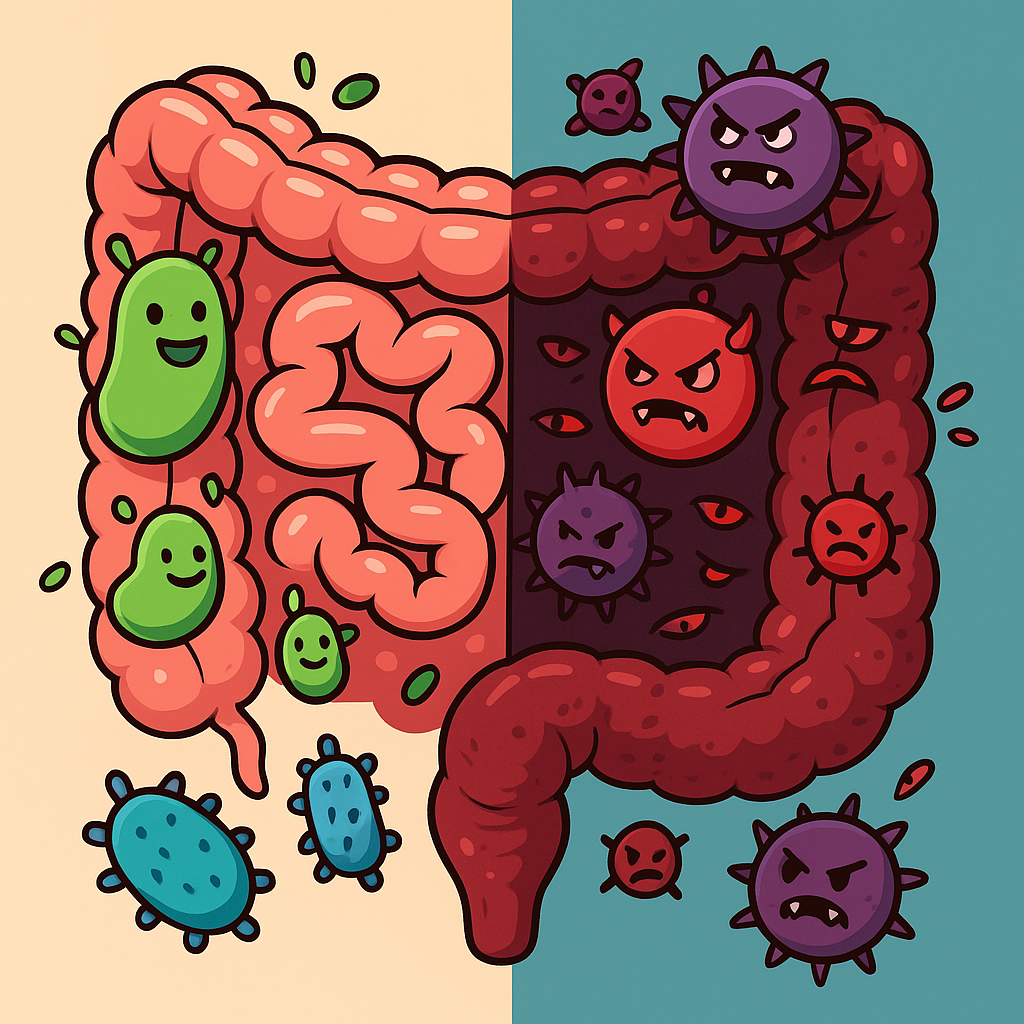
[…] 27,28). Recientemente hice un post de microbiota dónde puedes indagar más sobre la disbiosis (12). En simple se podría que si algo daña tu microbiota aumentará la […]